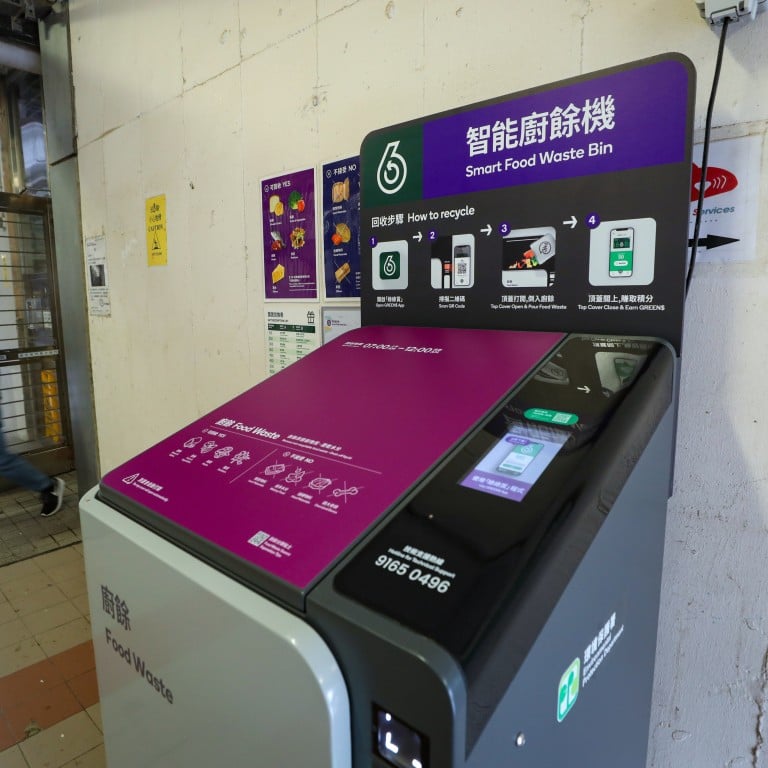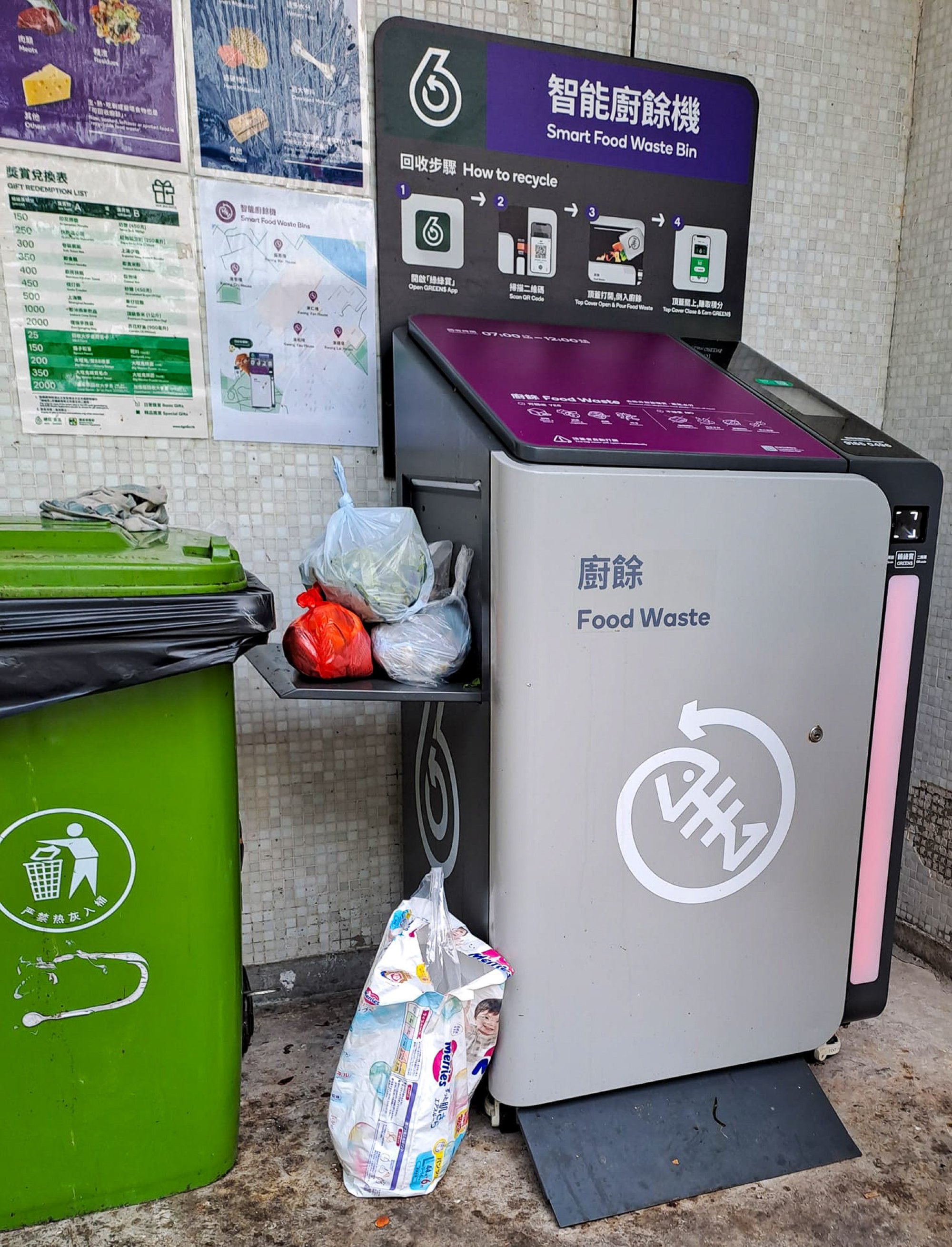
Hong Kong pilot scheme for ‘smart’ food waste bins may cover smaller private estates from June: official
- Environmental Protection Department says pilot scheme may soon be extended to private estates with fewer than 1,000 households
- Legislators have called for speedier installation of collection bins amid reports of residents from private estates disposing of food scraps at public housing facilities
A Hong Kong pilot scheme offering “smart” food waste collection bins may be expanded to smaller private housing estates as soon as June, a senior official has said, as lawmakers called for speedier citywide installation efforts.
Director of Environmental Protection Samuel Chui Ho-kwong told lawmakers on the same day that private estates with fewer than 1,000 households could have the option to apply for the special bins in a few months.
“We hope that this can be done in the middle of the year, around June,” Chui said.
The Environmental Protection Department pledged on Tuesday that it would complete the installation of more than 700 smart food waste recycling bins at all 213 public housing estates by August.
The pilot scheme currently accepts applications from private estates consisting of more than 1,000 households. About 40 out of more than 150 such requests have been approved since the initiative’s launch last year.
The department earlier estimated that more than 300 bins would be available at private estates by the end of the financial year as part of the pilot programme.
Legislator Chan Hoi-yan said on Wednesday that the number of food waste recycling bins was highly inadequate at present, given the city had 42,000 private residential estates and more than 3,700 “three-nil” buildings, or those that did not have property maintenance companies, owners’ corporations or residents’ organisations
She said environmental protection and recycling measures should not be unequally divided between public and private housing.

“Even if public housing estates have enough bins, it is necessary to assess whether the number located in private residential developments is also adequate,” Chan told a radio show. “But residents of public housing estates currently have to share one food waste-disposal unit between two buildings at the moment.”
She said residents from neighbouring estates were also dropping off their food waste at the public housing recycling facilities.
The department said it had installed about 530 bins in 70 per cent of the public estates so far, with each one able to collect 120 litres (32 gallons) of food waste. The smart system alerts cleaners to empty bins once they are 70 per cent full.
Lawmaker Chan said many residents she met during her visit to Un Chau Estate in Sham Shui Po were unaware of how to use the related mobile app and QR codes to open the bins, resulting in people leaving their food waste out in the open, which could cause hygiene problems.
“It is common for food waste to be generated at lunch and dinner. Authorities should address these peak periods by deploying additional staff to assist residents and speeding up the replacing of bins,” she said.
Wasted effort? Hongkongers trialling rubbish scheme fret over insufficient bins
Chui of the Environmental Protection Department said its data surveillance system showed just 1 per cent or less of its bins had temporarily ceased to operate at certain intervals as they were full or had experienced technical issues.
“If the big data system shows that many people are using those bins and there are not enough [in an estate], we will add more food waste bins there,” he said.
Beatrice Siu Wing-yin, senior public affairs officer of Greeners Action, said she hoped the government could bear the installation and management costs for private housing estates, given the pace of introducing such bins was relatively slow compared with the rate at public housing ones.
“We also notice the provision of recycling facilities in those three-nil buildings is severely inadequate,” Siu said. “We urge the government to expedite the implementation of convenient community recycling networks by integrating them into markets and public refuse collection points to meet the demand as soon as possible.”
The city produces more than 3,000 tonnes of kitchen waste daily, accounting for a third of all solid waste. The demand for recycling food waste is expected to rise rapidly if the government presses ahead with the waste-charging scheme.
There are about 900 food waste collection points across the city at present, taking in about 210 tonnes daily.
Flushing food waste down the toilet? Hong Kong’s poor predict rubbish fee chaos
Siu said the O-PARK1 facility, located in Oyster Bay on the northern part of Lantau Island, could process about 200 tonnes of food waste every day.
“With the coming O-PARK2, along with a waste water treatment plant, only about one-fifth to one-sixth of the [total] food waste will be treated based on our calculations,” she said. “We also hope that the government can swiftly enhance the necessary facilities in this regard.”
Lawmaker Gary Zhang Xinyu said implementing waste-charging policies was challenging because some residents supported the concept but found it difficult to adopt without adequate help, while others were less willing to accept the changes or had a limited understanding of its principles.
He proposed providing each household with a “reasonable” amount of free designated garbage bags per month, helping residents avoid additional expenses and providing more incentives.
“Allowing people time to adapt to the change can reduce resistance,” Zhang said. “I believe behaviour will change through [waste] charging but it takes time.”
He added that improving the overall recycling infrastructure was crucial at this stage, stressing that if the charging scheme was implemented poorly, some might perceive it as a tax and push back against it.


